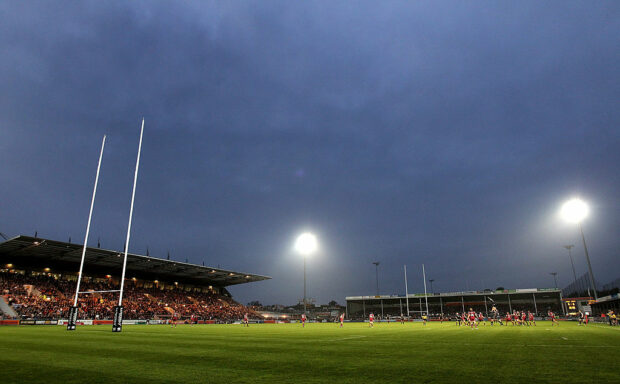Gary Reynolds, chief executive of Reading-based National One runners-up Rams and an investment officer for wealth management firm Courtiers, offers NEALE HARVEY his passionate opinions on the RFU's ‘mismanagement' of English rugby and why talk of a ring-fenced Premiership must end.
As CEO of an ambitious National League club, how do you view the growing prospect of a ring-fenced Premiership?
The issue is we don't know what the consequences would be and it's very dangerous to make a major decision to say that these will be the top clubs and that's it, the door is now shut on anyone else who may have higher ambitions.
First, we will be downgrading the Premiership product because there will be no promotion and relegation, and the consequence of that is that a club down there doesn't have to invest in new players, they can slash their wage bill and just survive. Everybody says this is a benefit, but it's a benefit to everybody except the fans because they're the ones who will suffer. Fans watching bottom end clubs are going to see a downgraded game because if you save money, you're not going to have the same quality players. Would that be attractive to television companies or sponsors? No. The Premiership should be aware that ring-fencing may actually make the product much less attractive to the average rugby fan, who may go off and watch another sport.
My second point is that if you shut the door in the face of aspiring clubs, then there's no Exeter and all of the Tier Two or lower league clubs who are investing in facilities with the dream of maybe one day being a Premiership club, that's gone. That could apply to any club up and down the country and, as we know in life, things change quickly and you just don't know who will emerge to challenge at the top. But if we ring-fence, we may see a reduction in investment in lower league clubs and that would be detrimental because people who put money into the community game are providing a vital function, which is to provide a rugby pathway from state schools. Before anyone makes a major decision like scrapping promotion and relegation, they need to think very carefully about all the consequences down the food chain.
Okay, but are you seriously suggesting the Rams could aspire to play in the top-flight?
Why not? Berkshire schools and clubs have produced good quality rugby players and the county punches above its weight. London Irish are going back to London and that opens up scope for the county and the Reading/Thames Valley area to pursue its own future and provide good quality rugby from one of its local clubs. Rams happen to be in the vanguard in Berkshire at the moment and what we want is the whole county moving forward and providing a great experience for kids in our schools, particularly our state schools.
We have a thriving academy, provide coaching into the university and work our socks off to give kids in local schools a great experience in the game, so who knows how far we could go? But what happens if you take that dream away, do you stop business people sponsoring the projects or their local clubs? If there'd been no chance of Bristol getting back to the Premiership when they were really struggling seven or eight years ago, do you think Steve Lansdown would have poured his money in there? We have a Berkshire and Thames Valley catchment area of a million-plus people, so do you want to cut that off? Those people, including many of them now at Bristol, who say ring-fencing would be financially successful really do need to think again.
What would your message to the RFU be on this?
Let's try and have a brighter future. Why do you want to say to somebody, ‘You're not coming into this exclusive group of 13 clubs'? The ring-fencers will say, ‘What if Newcastle go down?' or ‘What happens to the north-west if Sale drop off?'. Well, the north has a fantastic rugby tradition but it's from 1895 and it's called Rugby League. The only reason you've got that is because the RFU made a catastrophic decision over 100 years ago and it cost them the north of England. What they need to be careful of now is that they don't make another catastrophic decision, on top of all the other ones they've made recently with regards payments to the Premiership and Championship, which have been one of the main reasons for player wage inflation.
The RFU have poured the money in and anybody who understands anything about economics will understand that if money comes in, demand for a slice of that money increases and player wages go up. Ironically, having created that wage inflation in the Premiership and Championship, the RFU have now sat on the National League, counties and community clubs and hit them with swingeing cutbacks. It's like a block of flats where the RFU sit in the penthouse suite and turn the bath on and the water keeps running – then they have a go at the bottom flats and say, ‘Why's your floor wet?'. They're turning the water off now but the RFU should not be putting £28m a year into the Premiership because it's costing the rest of the game a fortune.
Why, in your view, have the RFU got things so wrong?
People involved in this game are generally very passionate. Some are passionate about their clubs, some are very passionate about their county and others are very passionate about their country. We are passionate about our governing body, but we have strong views and we're probably more diverse in our views than religion, which is saying something. But the structure of the RFU, with 50-odd people on the RFU Council, a professional group of administrators and a load of clubs who can't agree on what day of the week it is, let alone whether their should be ring-fencing, salary caps or the best way of getting the leagues going again, means you can never get agreement on anything.
The Council can't agree anything so we give it over to professional administrators and end up paying over the odds. I agree you need to pay for the best at executive level, but can you really tell me Bill Sweeney is worth nearly three times more than the CEO of the NHS? Is it right that in 2018, when the RFU were making 54 people redundant, their chairman, Andy Cosslett, took a 21 per cent wage increase? These are anomalies that should have been dealt with but the real problem is that the game – the clubs and the people involved – can never agree on anything. Who is suffering in all of this?
It's the state school kids that the clubs provide an opportunity for to take the game more seriously; it's the grassroots that has taken the hit and every time the RFU cut a community coach, which they're likely to do again now, it costs a child who hasn't got a private education the opportunity to make a go of the game. As community clubs, you're trying to get crumbs from the table but there's nothing on it now, it's bare. The RFU have spent what they had and spent what they didn't have – and that's now a big problem. However, perhaps it will create the river that cleans the Augean stables.
As a proud Englishman, does it pain you to see the national team being run predominantly by foreign coaches, with an Aussie, Eddie Jones, at the top?
Why do we have to keep appointing foreign coaches on huge money? England is one of the biggest rugby-playing nations in the world and the RFU should have the best coaching programmes, so why are we not producing the best coaches to run our own side? It's evidence of a failure of coach development. We are culturally poor at coaching and that applies to other sports as well. What we tend to do as a nation is accumulate a group of good players in the hope they will get you promoted, win you a title or a World Cup, but it's not enough.
Good players need good coaching so what the RFU should be doing is looking at coaches in the English game who are successful and promote them up, rather than recruit people who tick their boxes. It doesn't send a good message to the clubs that the biggest rugby community in the world cannot find decent English coaches to run their national team. At the Rams we manage to develop our own coaches, so why can't the RFU?
Back to the Rams and your ambitions, could you really follow the Exeter model and move up?
We could do, yes. I have huge admiration for everything Exeter have done and we'll be having dialogue with our Borough Council about developing a new site, but in the meantime, we're doing as much as we can at our current 11-acre ground at Old Bath Road. We've got five senior men's teams, a growing women's section and huge numbers at mini and junior level so we've spent £20,000 on pitch renovation and we've got a £150,000 project that's starting for a new stand and floodlights.

We're adding new bars and hard standing areas around the ground so that, with London Irish moving out, it will give us the best chance of attracting more local supporters. We could have the Madejski Stadium to play at if that opportunity ever came, which is why a route to the top must remain open.
How passionate are you about tapping into the state schools?
We are one of the sports that has the biggest concentration of ex-public schoolboys and I don't think we've done enough to solve the state school conundrum. If you're in a state school, you're lucky if you get a couple of decent sports sessions a week and even luckier if your teacher knows anything about rugby, but go to a private school and you'll have somebody who really understands the game, probably three or four teachers who can coach and about eight sports sessions a week. What chance have the state school kids got? More RFU cuts are not going to help and we're letting hundreds of kids – male and female – slip through our fingers.
What do you think of the Premiership's academy system?
I don't think the academies are honest enough. Rugby under the current system misses the late developers and what we often reward are the kids who physically develop earlier and therefore get looked at. If they have the aptitude and attitude to do well, they probably will and a fine example of that is Johnny Williams, below, who went through our junior section and was obviously going to be a top player. But not every player is like that and what tends to happen is boys get picked up at 13 or 14 who are more physically developed, then everyone else catches them up and by 17 or 18 they're dumped. Players will go into academies and have smoke blown up their backsides that they belong to this Premiership club or that, but they get to 18 and have the shock of their lives when they're out – and mentally that can be devastating because they might never have experienced failure up to that point. They've been a superstar at school level but then someone sits them on their behind and they're lost to the game.
We create an illusion for an academy player but the vast, vast majority won't make it and the data's never published because it would show shocking fallout rates. Parents need to wake up to the damage such an experience can do because while Premiership academies do what they can in terms of transition, the system doesn't work properly.
Bedford have agreed a formal player/coaching partnership with Northampton? Would Rams entertain a similar ‘buddy club' arrangement?
We won't subjugate ourselves to any Premiership side, no way. I'm buggered if we're ever going to play second fiddle to another club because once you've done that, you've accepted your place in the scheme of things and we've got bigger ambitions than that. If clubs want to talk to us about a dual-registration arrangement for a couple of players on a long-term basis, that's a different thing, but if you go any further than that you displace your own guys and ruin your club cohesion. Any player who comes on loan to us has to be prepared to fully buy-in and play for our second team if necessary. I don't care if you're the next Jonny Wilkinson, if you're not prepared to be a full part of the club, you're not for us. We can't have guys coming backwards and forwards, it's a waste of time.
Going back to the ring-fencing issue, what do you think the long-term damage might be of having a 12, 13 or 14-team elite in perpetuity?
We have a grassroots game with 1,500 clubs, so why would you want to emulate a sport like NFL in America which is purely about the elite and has no grassroots game to speak of. In America, you're either playing up through high school and college and are one of the very few who get to play at the top level, or you become a spectator at 21 or 22. Is that what we want in rugby? Are we prepared to cut loose the grassroots? Because we do not know what ring-fencing at the top end would do, it's a massive risk – potentially a bigger disaster than the 1895 decision not to allow payment to players. Tell me how it makes the grassroots stronger? I don't get it and it's a terrible thought process because you're playing with consequences that might be irreversible. I hear the argument about clubs at the top being overstretched financially, but the RFU shouldn't be worried about whether clubs go bust because that's the natural part of a thriving economy in a free-market environment. All you'll do by ring-fencing is take the competition away and downgrade the product.


























